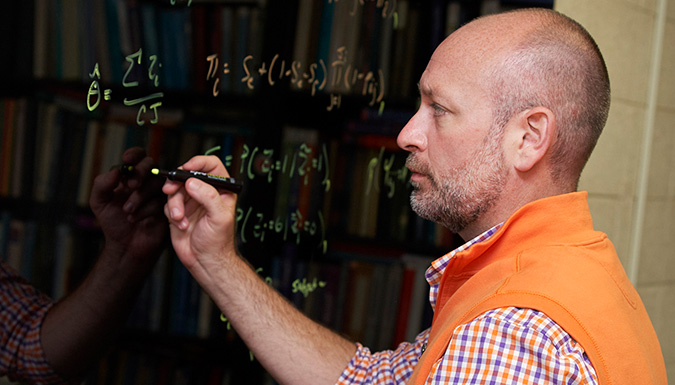Master’s Program Overview

Our Mission
Preparing The Next Generation of Mathematical Scientists
The mission of the Master of Science in mathematical sciences program is to prepare and train the next generation of mathematical scientists. M.S. students will familiarize themselves with a broad base of mathematical techniques from many areas of the mathematical sciences. The M.S. program is structured to introduce students to many areas of the mathematical sciences and develop deep knowledge in each student’s chosen area of specialization. Students will be involved in a significant research project and will be taught to effectively disseminate their findings through written publication and oral presentation. Upon receiving the M.S. degree, these students will be competent in a broad array of mathematical science techniques and will be effective communicators and teachers of basic mathematical sciences.
M.S. Degree Requirements
Prerequisites
To receive a Master of Science degree in mathematical sciences, the successful candidate will have completed prerequisites including basic courses in:
- Linear algebra.
- Differential equations.
- A computer language.
- Statistics.
- Advanced calculus (or real analysis).
- Modern abstract algebra.
- Probability.
Concentration Requirement
In addition to satisfying the breadth requirements, students must select an identifiable concentration area and take additional courses in that area. There are two tracks: thesis and non-thesis (project). Students pursuing the thesis option are required to pass two concentration courses in addition to the breadth courses and write a thesis. Students pursuing the project option are required to pass four concentration courses in addition to the breadth courses and complete a project.
Research
As a means of integrating the student’s program of diverse study, a master’s disquisition (project or thesis) must be completed by the end of the second year. The student makes an oral and written presentation of the master’s degree disquisition. M.S. students who are completing a master’s project should register for one hour of MATH 8920 during their last semester in the program. M.S. students who are completing a master’s thesis should register for a total of six hours of MATH 8910 during their last two semesters in the program.
Breadth Requirement
The master’s breadth requirement includes the completion of six graduate-level courses, one in each of the following: algebra, analysis, computing, operations research and statistics. An additional course is also required in either operations research or statistics. It is strongly suggested that students select from among the suggested courses listed here. Any deviation from the choices of breadth courses listed here should be pre-approved by the graduate coordinator and the student’s adviser. Area of study and suggested courses:
- MATH 8530, 8510 Algebra and Discrete Math
- MATH 8210 Analysis
- MATH 8600 Computational Math
- MATH 8100 Operations Research
- MATH 8000, 8050 Statistics
- MATH 8000, 8040, 8030, 8140 Operations Research or Statistics
Program Timeline
-
Semester One
- Focus on finishing three breadth courses.
- If this is a spring semester, attend the first-year seminar.
- International students should enroll in the language improvement course and work toward passing the Verification of English Skills Test.
-
Semester Two
- Finish breadth requirements and attend first-year seminar.
- Students who are supported as TAs should participate in the department’s teacher training course (which runs in the spring only).
- Choose a research adviser.
- Work with your adviser to identify a research committee (two more faculty members) and submit a committee selection form via iROAR.
- Ideally, students will identify their research projects and get started with research at the end of the second semester.
-
Semester Three
- Work with your research adviser to complete a plan of study. This should be submitted via iROAR early in the third semester.
- Students should make significant progress on their research projects by the end of the third semester.
- This is often when those on TA support begin their teaching responsibilities.
-
Semester Four
- There are many things to complete this semester before you graduate. Be sure to check the Graduate School deadlines for thesis defenses and graduation applications.
- Complete your research project.
- Write up your project or thesis.
- Defend the thesis or project. The defense will need to be scheduled according to the oral presentation guidelines. If you have questions or have issues, contact Connie McClain, student services coordinator. Oral presentation guideline can be found on the Graduate Studies Overview Page.
- Graduate!
